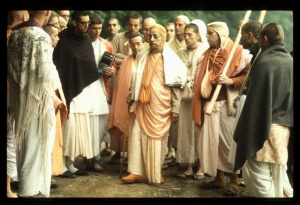SB 3.11.9: Difference between revisions
m (1 revision(s)) |
No edit summary |
||
| Line 1: | Line 1: | ||
{{info | {{info | ||
|speaker=Maitreya | |speaker=Maitreya Ṛṣi | ||
|listener=Vidura | |listener=Vidura | ||
}} | }} | ||
[[Category:Srimad-Bhagavatam - Canto 03 Chapter 11|S09]] | |||
[[Category:Bhagavatam Verses Spoken by Maitreya Rsi - Vanisource|031109]] | |||
<div style="float:left">'''[[Srimad-Bhagavatam]] - [[SB 3|Third Canto]] - [[SB 3.11: Calculation of Time, from the Atom|Chapter 11: Calculation of Time, from the Atom]]'''</div> | |||
<div style="float:right">[[File:Go-previous.png|link=SB 3.11.8]] '''[[SB 3.11.8]] - [[SB 3.11.10]]''' [[File:Go-next.png|link=SB 3.11.10]]</div> | |||
{{RandomImage}} | |||
==== TEXT 9 ==== | ==== TEXT 9 ==== | ||
<div | <div class="verse"> | ||
dvādaśārdha-palonmānaṁ | :dvādaśārdha-palonmānaṁ | ||
caturbhiś catur-aṅgulaiḥ | :caturbhiś catur-aṅgulaiḥ | ||
svarṇa-māṣaiḥ kṛta-cchidraṁ | :svarṇa-māṣaiḥ kṛta-cchidraṁ | ||
yāvat prastha-jala-plutam | :yāvat prastha-jala-plutam | ||
</div> | </div> | ||
| Line 16: | Line 22: | ||
==== SYNONYMS ==== | ==== SYNONYMS ==== | ||
<div | <div class="synonyms"> | ||
dvādaśa- | ''dvādaśa-ardha''—six; ''pala''—of the scale of weight; ''unmānam''—measuring pot; ''caturbhiḥ''—by weight of four; ''catuḥ-aṅgulaiḥ''—four fingers by measure; ''svarṇa''—of gold; ''māṣaiḥ''—of the weight; ''kṛta-chidram''—making a hole; ''yāvat''—as long as; ''prastha''—measuring one ''prastha''; ''jala-plutam''—filled by water. | ||
</div> | </div> | ||
| Line 23: | Line 29: | ||
==== TRANSLATION ==== | ==== TRANSLATION ==== | ||
<div | <div class="translation"> | ||
The measuring pot for one nāḍikā, or daṇḍa, can be prepared with a six-pala-weight [fourteen ounce] pot of copper, in which a hole is bored with a gold probe weighing four māṣa and measuring four fingers long. When the pot is placed on water, the time before the water overflows in the pot is called one daṇḍa. | The measuring pot for one nāḍikā, or daṇḍa, can be prepared with a six-pala-weight [fourteen ounce] pot of copper, in which a hole is bored with a gold probe weighing four māṣa and measuring four fingers long. When the pot is placed on water, the time before the water overflows in the pot is called one daṇḍa. | ||
</div> | </div> | ||
| Line 30: | Line 36: | ||
==== PURPORT ==== | ==== PURPORT ==== | ||
<div | <div class="purport"> | ||
It is advised herein that the bore in the copper measuring pot must be made with a probe weighing not more than four māṣa and measuring not longer than four fingers. This regulates the diameter of the hole. The pot is submerged in water, and the overflooding time is called a daṇḍa. This is another way of measuring the duration of a daṇḍa, just as time is measured by sand in a glass. It appears that in the days of Vedic civilization there was no dearth of knowledge in physics, chemistry or higher mathematics. Measurements were calculated in different ways, as simply as could be done. | It is advised herein that the bore in the copper measuring pot must be made with a probe weighing not more than four ''māṣa'' and measuring not longer than four fingers. This regulates the diameter of the hole. The pot is submerged in water, and the overflooding time is called a ''daṇḍa''. This is another way of measuring the duration of a ''daṇḍa'', just as time is measured by sand in a glass. It appears that in the days of Vedic civilization there was no dearth of knowledge in physics, chemistry or higher mathematics. Measurements were calculated in different ways, as simply as could be done. | ||
</div> | </div> | ||
__NOTOC__ | |||
<div style="float:right; clear:both;">[[File:Go-previous.png|link=SB 3.11.8]] '''[[SB 3.11.8]] - [[SB 3.11.10]]''' [[File:Go-next.png|link=SB 3.11.10]]</div> | |||
__NOTOC__ | |||
__NOEDITSECTION__ | |||
Revision as of 04:55, 5 May 2021

A.C. Bhaktivedanta Swami Prabhupada
TEXT 9
- dvādaśārdha-palonmānaṁ
- caturbhiś catur-aṅgulaiḥ
- svarṇa-māṣaiḥ kṛta-cchidraṁ
- yāvat prastha-jala-plutam
SYNONYMS
dvādaśa-ardha—six; pala—of the scale of weight; unmānam—measuring pot; caturbhiḥ—by weight of four; catuḥ-aṅgulaiḥ—four fingers by measure; svarṇa—of gold; māṣaiḥ—of the weight; kṛta-chidram—making a hole; yāvat—as long as; prastha—measuring one prastha; jala-plutam—filled by water.
TRANSLATION
The measuring pot for one nāḍikā, or daṇḍa, can be prepared with a six-pala-weight [fourteen ounce] pot of copper, in which a hole is bored with a gold probe weighing four māṣa and measuring four fingers long. When the pot is placed on water, the time before the water overflows in the pot is called one daṇḍa.
PURPORT
It is advised herein that the bore in the copper measuring pot must be made with a probe weighing not more than four māṣa and measuring not longer than four fingers. This regulates the diameter of the hole. The pot is submerged in water, and the overflooding time is called a daṇḍa. This is another way of measuring the duration of a daṇḍa, just as time is measured by sand in a glass. It appears that in the days of Vedic civilization there was no dearth of knowledge in physics, chemistry or higher mathematics. Measurements were calculated in different ways, as simply as could be done.